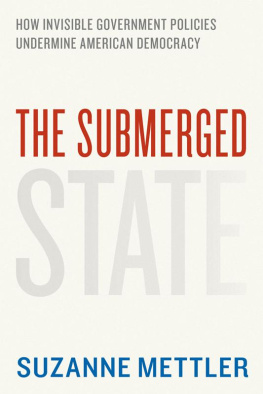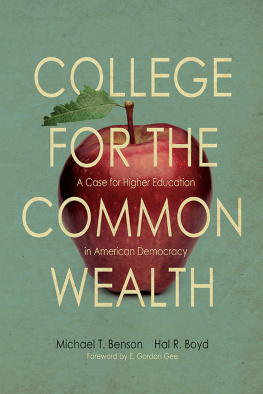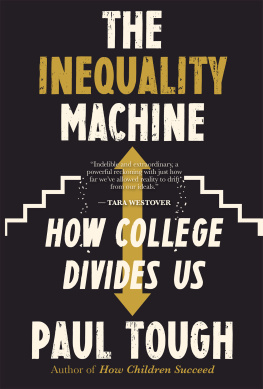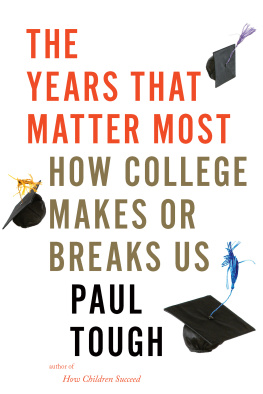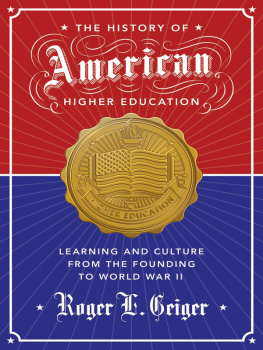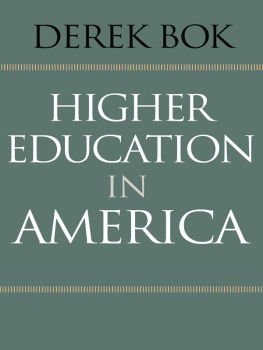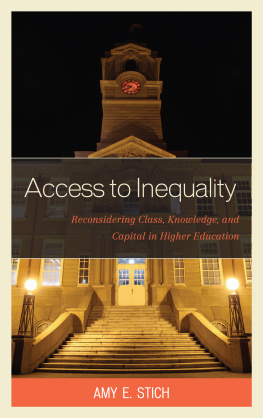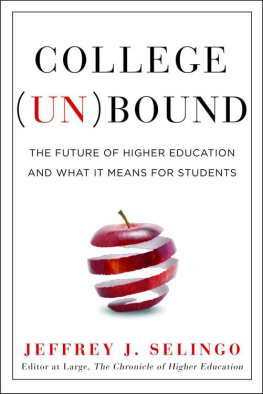DEGREES OF INEQUALITY
ALSO BY SUZANNE METTLER

The Submerged State
Remaking America
Soldiers to Citizens
Dividing Citizens

Copyright 2014 by Suzanne Mettler
Published by Basic Books,
A Member of the Perseus Books Group
All rights reserved. No part of this book may be reproduced in any manner whatsoever without written permission except in the case of brief quotations embodied in critical articles and reviews. For information, address Basic Books, 250 West 57th Street, 15th Floor, New York, New York 10107.
Books published by Basic Books are available at special discounts for bulk purchases in the United States by corporations, institutions, and other organizations. For more information, please contact the Special Markets Department at the Perseus Books Group, 2300 Chestnut Street, Suite 200, Philadelphia, PA 19103, or call (800) 810-4145, ext. 5000, or e-mail .
Some material in chapter 2 was adapted from Suzanne Mettler Promoting Inequality: The Politics of Higher Education Policy in an Era of Conservative Governance, in The Unsustainable American State, edited by Lawrence Jacobs and Desmond King (New York: Oxford University Press, 2009), pp. 197222; some material in chapter 5 adapted from Suzanne Mettler, The Submerged State: How Invisible Government Policies Undermine American Democracy (Chicago: University of Chicago Press, 2011) and some from Suzanne Mettler, Eliminating the Market Middle-Man: Redirecting and Expanding Support for College Students, in Reaching for a New Deal: Ambitious Governance, Economic Meltdown, and Polarized Politics in Obamas First Two Years, edited by Theda Skocpol and Lawrence R. Jacobs 2011 Russell Sage Foundation, 112 East 64 Street, New York, NY 20065. Reprinted with permission.
Designed by Trish Wilkinson
Set in 11.5 point Minion Pro
Library of Congress Cataloging-in-Publication Data
Mettler, Suzanne.
Degrees of inequality : how the politics of higher education sabotaged the American dream / Suzanne Mettler.
pages cm
ISBN 978-0-465-07200-2 (e-book) 1. Education, HigherPolitical aspectsUnited States. 2. Education, HigherSocial aspectsUnited States. 3. Education, HigherEconomic aspectsUnited States. 4. Educational changeUnited States. I. Title.
LC173.M48 2014
378.73dc23
2013043678
10 9 8 7 6 5 4 3 2 1
For Jeanne
CONTENTS
ON FEBRUARY 18, 2011, SOMETHING UNUSUAL HAPPENED IN THE HOUSE of Representatives. It was in the midst of the 112th Congress, which earned the distinction of being the most polarized along party lines of any in modern history. Whats more, minority leader Nancy Pelosi, House Democratic National Committee chair Debbie Wasserman Schultz, and members of the Black Caucus joined together with the entire Tea Party contingent. What brought this unlikely crew together?
The issue in question involved the so-called for-profit colleges, previously known as trade schools, proprietary schools, or career colleges. Enrollment in these institutions had exploded nearly tenfold in less than two decades, from 226,818 in 1993 to over 2 million in 2010.Department of Education under the Obama administration proposed restricting their use of student aid funds under the Higher Education Act of 1965, Americas landmark law that provides financial aid to college students.
In some respects, for-profit schools have distinguished themselves as inclusive innovators that dared to deviate from the established routines of traditional universities. They led the way in offering online educationa move that other institutions are racing to catch up with and emulate. They introduced flexible course scheduling to accommodate the needs of nontraditional students, whose lives are often packed with work and family responsibilities. As a result, these schools have attracted many students from less advantaged backgrounds, who might not otherwise have enrolled in college.
But the for-profits also charge substantial tuition$15,172 per year on average for full-time undergraduates in 20122013. Although this amount is lower than private nonprofits cost of $29,056, it is nonetheless substantial compared to $8,655 at four-year public universities and $3,131 at community colleges. This combination of higher tuition, questionable job prospects, and burdensome debt means that many for-profit schools leave a large number of their students worse off than if they had never attempted to pursue advanced education in the first place.
Ironically, despite being regarded as part of the private sector, the for-profits are financed almost entirely by American taxpayers. They enroll about one in ten college students today, but utilize one in four
So, we have substandard educational institutions producing many students who cant get good jobs, costing taxpayers billions. Question: who is actually benefiting from this arrangement? Answer: the businesspersons who own them and their corporate shareholders. The largest for-profits, though subsidized almost entirely by government, are now publicly traded on Wall Street, and during the 1990s and early 2010s they reaped enormous profits. Even in the midst of the financial downturn in 2008, the top nine companies enjoyed 4 percent growth in their stocks, while the S&P 500 declined by 39 percent.
Which brings us back to the surprising moment of bipartisanship in February 2011. A significant number of Democrats united with Republicans to oppose new regulations being developed by the Department of Education, rules that would make student aid to the for-profits contingent on their performance. A mere seventeen months earlier, when the House had voted on a major overhaul of federal student aid that terminated bank-based lending and strengthened Pell grants, partisan politics prevailed: only six Republicans supported it and only four Democrats opposed it.colleges and universities that has little to show for itselfaside from its ability to channel profits to business leaders and investors.
This vote could easily be passed off as small and insignificant. It involved only an amendment to a large budget bill, and it was dropped in the Senate version, never coming to a vote. Yet it showcases in microcosm a tragedy that has befallen the United States. To begin with, while the for-profits appear to give struggling Americans a shot at improving their life circumstances, in reality, these schools leave many worse off, to the point of financial ruin. Simultaneously, they lavish abundant profits on owners and corporate shareholdersat taxpayer expenseeffectively benefiting the affluent even as they destroy the lives of the less advantaged. Most egregiously, the US government not only condones these circumstances but actively facilitates and sponsors them through nearly full subsidization of such schoolspaired with, at present, only minimal regulation of how they conduct themselves. But the nations support of the for-profits is not an isolated instance of public policy that has gone off course; instead, it is one of several developments that, in combination, amount to an abdication of one of the nations proudest legacies: the promotion of higher education and, through it, the promise of the American dream.
The United States from its beginnings distinguished itself as a pioneer in fostering the development of a large and diverse array of colleges and universities. Then in the mid-twentieth century, landmark public policies ushered in a golden age of educational opportunity. Through federal policies ranging from the GI Bill through Pell grants, and extensive state-level support for public institutions of higher education, the nation expanded access to college to growing numbers of Americans from across the income spectrum. People from humble backgrounds became the first in their families to attain college diplomas, enabling them to enjoy occupational choices and a standard of living their parents could only have dreamed of, and to pass those advantages on to their own children.
Next page

